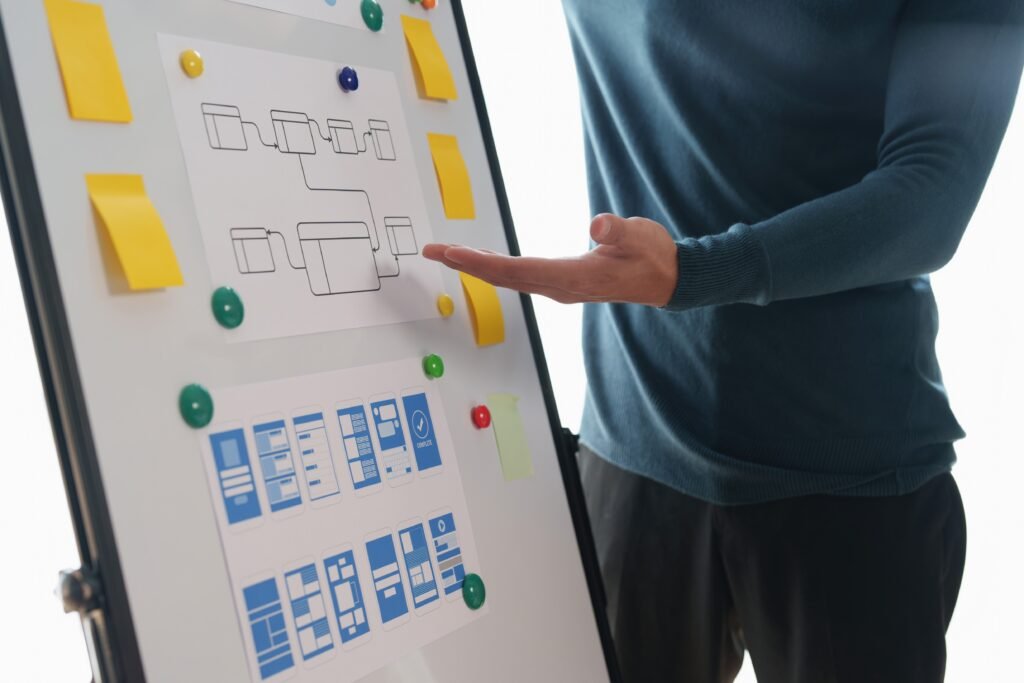Application Development Services
Application Development Services create tailored software solutions to meet specific business needs.
“Application Development” refers to the process of designing, creating,
deploying, and maintaining software applications. These applications can
range from desktop and mobile apps to web-based platforms and enterprise
software solutions. Here’s a more detailed breakdown of what application
development involves:

Requirement Analysis
Understanding what the application needs to do based on
user needs, business goals, and technical constraints. This involves gathering and
analyzing requirements from stakeholders.
Planning and Design
Creating a blueprint for the application, including its
architecture, user interface (UI), user experience (UX), and overall functionality. This
step often includes wireframes, mockups, and design documents.


Development
Writing the code to build the application. This involves selecting
appropriate programming languages, frameworks, and tools based on the
application’s requirements and intended platform (e.g., iOS, Android, web).
Testing
Ensuring the application functions correctly and is free of bugs. This
includes various types of testing, such as unit testing, integration testing, system
testing, and user acceptance testing (UAT).


Deployment
Releasing the application to users. This could involve publishing it to
app stores, deploying it to servers, or distributing it through other channels.
Maintenance and Updates
Continually improving the application by fixing bugs,
updating features, and ensuring compatibility with new technologies or operating
systems.


Documentation
Creating user manuals, technical documentation, and other
supporting materials to assist users and developers in understanding and using
the application.
Support
Providing ongoing assistance to users, addressing issues, and ensuring
that the application remains functional and effective over time.

“Customize system development” refers to the process of creating or
modifying software systems to meet the specific needs and requirements of a
particular organization or user. Here’s a breakdown of what it typically
involves:
Requirement Gathering
Understanding the unique needs, goals, and workflows
of the organization or individual that will use the system. This often involves
detailed discussions and analysis.


System Design
Creating a design that aligns with the gathered requirements.
This includes defining the architecture, user interfaces, and functionalities that the
customized system will offer.
Development
Coding and building the system according to the design
specifications. This could involve custom software development from scratch or
tailoring existing software to fit specific needs.

Testing
Rigorously testing the customized system to ensure it functions correctly
and meets all the specified requirements. This step is crucial for identifying and
fixing any issues before deployment.
Implementation
Deploying the customized system in the real-world environment
where it will be used. This often includes data migration, user training, and
configuring the system for operational use.


Maintenance and Support
: Providing ongoing support and making necessary
updates or adjustments to ensure the system continues to meet evolving needs.
Customization can be done for various types of systems, including:
Enterprise Resource Planning (ERP) Systems: Tailoring ERP systems to fit the specific processes and workflows of a business.
Customer Relationship Management (CRM) Systems: Adjusting CRM systemsto better handle customer interactions and data.
Let's Discuss Your Business Goals & Schedule A Free Consultation Today
Let’s discuss your business goals and schedule a free consultation today. Discover how we can help you achieve success.
